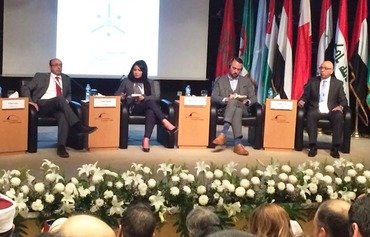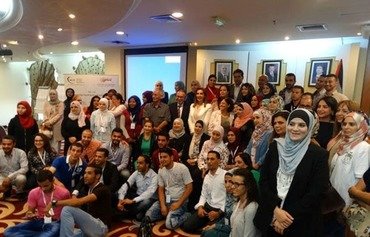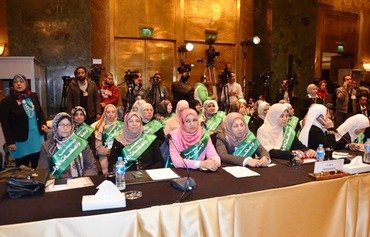Bahraini youth meeting in Manama on May 29th and 30th called for the development of a comprehensive national media strategy to combat extremism.
To get this process started, participants at the 'Youth Against Extremism' conference, held by the Isa Cultural Centre in co-operation with a number of public and private universities, recommended the establishment of a national co-ordinating committee for combating extremism and terrorism in all its forms.
The proposed new panel will comprise representatives from the security, legislative, legal, educational, cultural, economic, religious, social and media authorities, in addition to private and civil society organisations.
Participants also called for the consolidation of the culture of patriotism and the promotion of tolerance and respect for intellectual diversity, in concert with Islamic precepts.
They recommended that efforts be made to highlight moderate religious, cultural and national symbols so that they may serve as a guiding light to all members of the community, including young people.
They also recommended that all religious figures, institutions and pulpits that target youth, promote hatred and exclusion, and incite violence and terrorism be monitored. They called for deterrent punishments to be meted out within the scope of the law and the framework of free exercise of rights and freedom of expression, in order to dry up the wellsprings of extremism.
The conference addressed the origin, effects and dangers of extremism from an ideological, legal, religious and social perspective; the media and extremism; and the need to protect and immunise youth and society against extremism.
Activating the role of young people
"The conference achieved its objectives of promoting among the youth its concepts of moderation, centrism, acceptance of others and respect for diversity, as well as activating the role of the youth of both sexes to actively participate in the societal change and advancement process," said Isa Cultural Centre executive director Sheikh Khalid bin Khalifa Al Khalifa.
The youth attending the conference were keen to discuss counter-terrorism issues, he noted, "which is indicative of the awareness of the new generation of the dangers of extremism, violence and ideas that are destructive to the local community, and the impact of regional events on local affairs".
He stressed the need for youth to be open to the world, while exercising caution in absorbing the ideas and means of communication presented to them, and to be able to withstand the brainwashing techniques used by terrorist groups.
Awareness workshops and youth conferences will provide "the new generations with added immunity and speak to the youth’s proclivity for building and development, away from the ideas of destruction and devastation", he added.
"Bahrain was and continues to be a leader in the discussion and review of previously unaddressed ideas presented by young people," said Amer al-Saeedi, assistant professor at the Royal University for Women’s faculty of law.
Youth contributions during the conference sessions were "bold and novel in putting forth non-traditional solutions to combat extremism", he said.
Bahrain's interest in combating extremism
Holding this kind of conference at this point in time reflects Bahrain's interest on all official and popular levels in combating extremist ideas, al-Saeedi added.
There is a strong drive to educate young people about the dangers of extremism and turn Bahrain into "a unique global model" of tolerance and co-existence, he said.
Involving youth in the decision-making process has become a matter of urgency in this new era, he said, adding that they have become a pivotal factor in steering the country and the region towards peace, security and stability.
"Unfortunately, the youth have become terrorism’s primary tool, and therefore it is imperative to engage them in putting forth practical and scientific ideas that contribute to combating extremism," he said.
It is vital that such events "examine closely the ideas and mindsets of a segment that is directly targeted by terrorist groups", he noted.
"Terrorism is a form of narrow-mindedness and introversion, and fighting it requires openness and expanding the space for freedom and dialogue," al-Saeedi said.
He pointed to Saudi Arabia as an example of a country which has exerted great efforts to activate intellectual and religious dialogue and has achieved a large measure of success in fighting the scourge of terrorism.
Consolidating the youth message
The conference provided a "golden opportunity for the youth to present their ideas and review their intellectual and creative experiences", said conference participant Salman al-Amer, representing the Royal Charity Organisation.
Young people use a common modern language between them, "making the message from the youth to the youth more profound and influential", he added.
The responsibility of setting young people on the right path starts in childhood with the involvement of parents, family, school, mosque and the media, he said.
At the same time, he added, "Arab societies, particularly Gulf societies, are required to fight criminal practices that have no connection to religion whatsoever through stringent legislation and strengthening educational and counseling programmes for the youth, who are being brainwashed with radical ideas in the pursuit of terrorist ends".
The conference’s most important recommendations called for the enhancement of academic efforts and encouragement of youth to conduct and publish research studies that discuss extremism in its various dimensions, he said.
These would address extremism as a global, historical and social phenomenon, he added, and would study its propensity to evolve and ways to counter it.
He also stressed the importance of clarifying and defining terms related to extremism, fanaticism, takfir and terrorism, including them in educational curricula in the kingdom, and legally framing their use.

![Young Bahrainis take part in the 'Youth Against Extremism' conference, held May 29th and 30th at the Isa Cultural Centre in Manama. [Mohammed al-Jayousi/Al-Shorfa]](/cnmi_am/images/2016/06/10/5561-Bahrain-youth-extremism-600_384.jpg)






